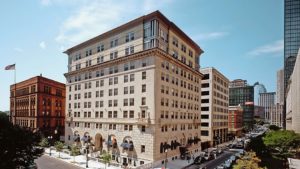
The new owners of the former Loews Boston hotel are targeting “bleisure” travelers who combine business trips with sightseeing after acquiring the property for $117 million in August and announcing $20 million in upgrades. Photo courtesy of JLL
Shuttered hotels and skeleton-crew staffs are fading into distant memory as the Boston lodging market approaches a full financial recovery from the depths of their pandemic plunge.
In contrast to previous economic downturns, hotel owners largely have resisted slashing room rates to boost occupancy. And travelers are willing to pay, with average room rates in Boston and Cambridge surpassing pre-COVID levels this year.
“Looking at past recessions, you cut rates to increase occupancy. That didn’t happen this time,” said Rachel Roginsky, principal and owner of consultants Pinnacle Advisory Group. “This is the first time in 30 years that I can recall average daily rates driving the recovery.”
Industry executives say pent-up demand and a roaring return of tourism business gave hotel owners the leverage to hold firm.
Through October, average room rates were $287 at Boston and Cambridge hotels in 2022, with an occupancy rate of 71 percent.
Global Magnet for Investment
A recent survey by JLL ranked Greater Boston’s approximately 63,000-room hotel market as one of the top three targets of investors globally, trailing only London and Tokyo.
The hotel investor sentiment survey cited Boston’s strong recovery burgeoning life science industry and rebounding leisure market. The opening of the Raffles Boston Back Bay Hotel & Residences next spring will elevate high-end rates in the city, JLL predicts.
Occupancy rates are already in striking distance of pre-pandemic levels in the core Boston market, following a steady recovery that started in the spring driven by the leisure market.
In October, the most recent month for which data is available, Boston and Cambridge hotel occupancy rates were just 2 percent below 2019 levels, according to Pinnacle Advisory Group.
Average daily rates have topped 2019 levels in every month since May. And revenues per available room – a key measure of a hotel’s performance that blends occupancy levels with room rates – surpassed 2019 levels for the first time in September and October, according to Pinnacle research.
“Coming out of the pandemic, the leisure travelers were certainly driving the momentum here,” said Alan Suzuki, a managing director in capital markets for JLL Boston. “Even in this inflationary environment, people wanted to travel, there was pent-up demand and international borders were starting to open up. People were just paying the rates.”
Uncertainty still clouds the outlook for winter and early spring, and future demand for business and convention-driven group bookings.
Developers Wait for Costs to Cool
Several developers moved forward with downtown Boston hotel proposals as the pandemic eased, but are waiting for potentially more favorable construction and financing climates in 2023 to break ground.
After gaining approval for a 31-room hotel at 88 North Washington St. in the West End last year, developer Boston Real Estate Collaborative is waiting out the inflation cost and interest rate climate.
Managing Partner Brent Berc expects more competitive bidding to emerge among building contractors in 2024.
“We are starting to get calls from people trying to line up jobs, and that hasn’t happened for 12 to 18 months,” Berc said.
Allston-based City Realty also is taking a wait-and-see approach to the timeline for its 80-room hotel approved last month on Hamilton Place in Downtown Crossing.
Director of Acquisitions Clifford Kensington said the company is evaluating a variety of building types including steel, concrete and mass timber amid a volatile cost environment. The firm is in the early stages of raising equity, targeting approximately a 60-to-40 loan-to-cost ratio. Kensington estimated a financing agreement and groundbreaking could take place in fall 2023.
A 134-room hotel at 42 Cross St. in North End remains delayed by a lawsuit filed by a neighbor, developer William Caulder confirmed.

Steve Adams
Developers looking for financing to build new hotels still face a hostile climate because of interest rate hikes and construction costs that have risen up to 30 percent, according to JLL research.
“There’s still risk factors out there and also construction costs are up, so the numbers don’t pencil,” Suzuki said.
While hotel investment sales activity has been sluggish, some investors have seen opportunities to upgrade existing properties. In Boston’s largest deal of the year, AKA and Electra America paid $117 million for the Loews Boston hotel in August. The joint venture rebranded the 225-room Berkeley Street property as Hotel AKA Back Bay and plans to invest $20 million on guest room renovations, new common-area amenities and updates to Precinct Kitchen + Bar.
The JLL report indicates that hotel investors across the globe are opting for upgrades to existing properties over new construction in the short term.
“Development is not impossible today, but it’s challenging,” Suzuki said. “And that’s good for the industry. [Existing hotels’] performance is starting to improve from an operating perspective, and it gives them the runway to get back to where they were pre-pandemic.”





